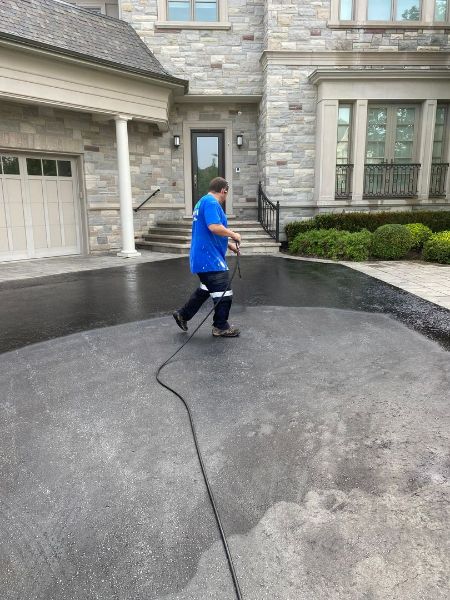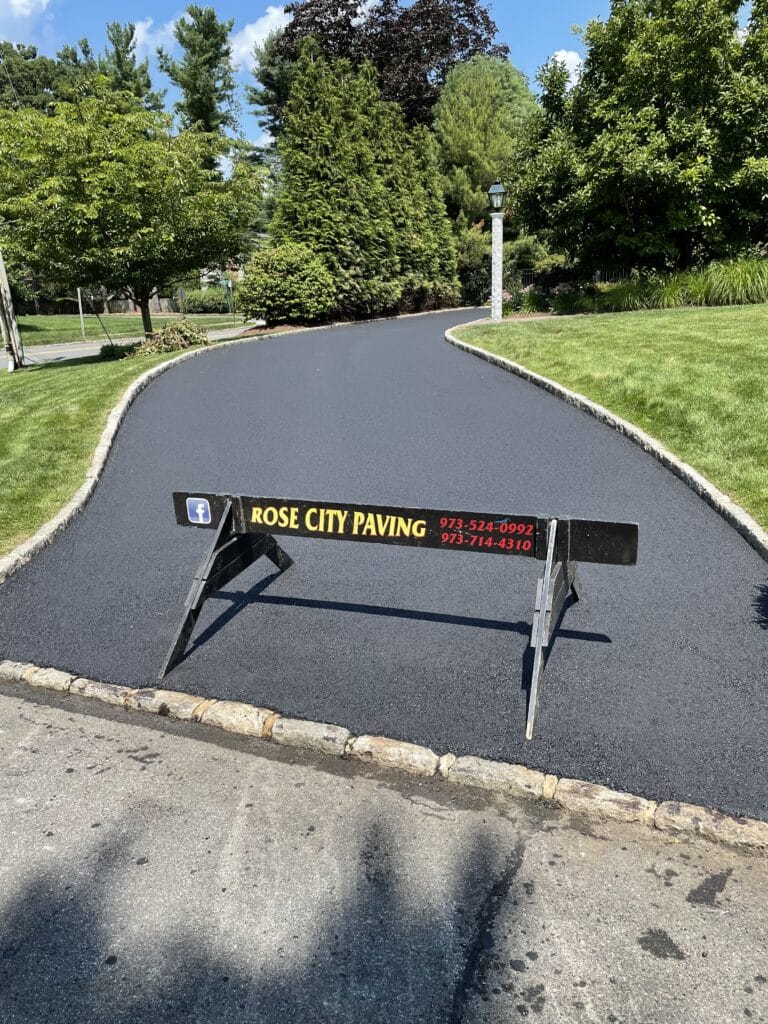Discover the Power of Commercial Parking Lot Paving and Asphalt Sealing
Discover the Power of Commercial Parking Lot Paving and Asphalt Sealing
Blog Article
Hot Mix Asphalt: A Sustainable Solution for Pavement
Warm Mix Asphalt (HMA) has arised as a leading sustainable option for sidewalk remedies, offering a myriad of ecological advantages and ingenious innovations. As the demand for green building techniques grows, exploring the nuances of HMA's sustainability can provide important insights right into the future of pavement options.
Environmental Benefits of Warm Mix Asphalt

Furthermore, Warm Mix Asphalt helps to alleviate urban warm island results. Its dark color soaks up sunlight, lowering the amount of warmth mirrored back right into the atmosphere contrasted to lighter-colored sidewalks. This can lower ambient temperatures in city areas, reducing the need for a/c and ultimately lowering energy usage.
Furthermore, Hot Mix Asphalt adds to improved stormwater administration. Its permeable nature enables water to charge and infiltrate the pavement groundwater products, decreasing runoff and the risk of flooding. These environmental advantages make Warm Mix Asphalt a lasting selection for leading roads and highways.
Energy Efficiency in HMA Production
Is energy effectiveness an essential factor in the manufacturing of Warm Mix Asphalt (HMA)? Definitely. Power plays a significant role in the manufacturing of HMA, impacting both cost and ecological sustainability. One key facet of power performance in HMA production is making use of warm mix asphalt (WMA) innovations (regrading). WMA allows for the blending and placement of asphalt at reduced temperatures compared to traditional warm mix asphalt, leading to minimized power consumption during manufacturing. This procedure not only lowers gas use but also decreases greenhouse gas discharges, making it a much more ecologically friendly alternative.
In addition, advancements in plant modern technologies have led to more energy-efficient HMA manufacturing procedures. Modern plants are developed with features like recycled asphalt sidewalk (RAP) handling abilities, reliable burner systems, and enhanced insulation, all adding to power cost savings. By optimizing energy use in HMA manufacturing, the industry can lower its carbon footprint while keeping high-grade sidewalk materials. Power efficiency is, consequently, a vital factor to consider in making certain the sustainability of Hot Mix Asphalt production.
Recyclability of Warm Mix Asphalt
The recyclability of Hot Mix Asphalt (HMA) is a critical element of its sustainability and long-lasting ecological impact. HMA is one of the most recycled products in the USA, with over 100 million lots of reclaimed asphalt pavement (RAP) being reused every year in brand-new pavement building and construction. Reusing HMA offers several environmental benefits, such as lowering the need for virgin materials, decreasing energy intake during production, and reducing the amount of waste sent to garbage dumps.
The procedure of recycling HMA involves milling the existing pavement, crushing it into smaller pieces, and mixing it with new aggregate and asphalt binder to create a recycled mix. This recycled mix can typically execute as well as or perhaps better than traditional HMA, while needing fewer resources and generating reduced greenhouse gas exhausts. By including RAP right into new sidewalk tasks, roadway companies can save natural deposits, decrease costs, and minimize the environmental impact of roadway building and construction and upkeep tasks. Generally, the recyclability of HMA plays a substantial duty in promoting sustainable methods within the pavement industry.

Long-Term Efficiency of HMA
Asphalt pavements demonstrate sturdiness and durability over an extended period, reflecting the long-term performance of Warm Mix Asphalt (HMA) The long life of HMA can be credited to its capacity to stand up to rush hour lots, severe weather, and the effects of aging. Studies have actually revealed that properly designed and properly created HMA sidewalks can last for twenty years or more with regular upkeep. The key to optimizing the lasting performance of HMA depends on using high-quality products, complying with best practices in construction, and implementing reliable maintenance techniques. Correct water drainage, routine inspections, and prompt repair services are crucial for protecting the structural integrity of HMA pavements over time. Furthermore, improvements in HMA technology, such as using polymer-modified binders and warm mix asphalt, visit site have additionally boosted the longevity and durability of HMA pavements. By focusing on quality building and construction and maintenance methods, HMA continues to show itself as a cost-effective and lasting service for long-lasting sidewalk framework.

HMA: Resilience and Sustainability
Showing both toughness and sustainability, Warm Mix Asphalt (HMA) has come to be a foundation in the building and construction of resilient sidewalk facilities - angled parking. HMA's durability comes from its capacity to stand up to hefty tons, rough weather, and high traffic quantities, making it blog here a dependable selection for roadways, highways, and airport terminal runways. The structure of HMA, which typically includes accumulations, binder, and filler, plays an essential function in boosting its longevity and resistance to tear and put on
Moreover, HMA's sustainability hinges on its recyclability and energy-efficient manufacturing procedure. The capacity to reuse recovered asphalt sidewalk (RAP) in brand-new HMA mixtures decreases the demand for virgin materials and decreases the ecological impact of pavement building and upkeep. Additionally, the power efficiency of creating HMA hinges on its reduced blending temperature levels contrasted to various other pavement products, leading to minimized power intake and greenhouse gas exhausts.
Final Thought
To conclude, hot mix asphalt (HMA) provides a sustainable solution for pavement with its ecologically friendly qualities. HMA's recyclability, energy effectiveness in production, and long-lasting toughness make it an environmentally friendly selection for roadway construction. By conserving natural deposits, lowering waste, and decreasing greenhouse gas discharges, HMA plays a critical duty in advertising sustainability in facilities advancement. Its capability to mitigate urban heat island results even more underscores its significance in creating resilient and eco mindful pavement systems.
HMA is one of the most recycled products in the United States, with over 100 million lots of reclaimed asphalt click here for info sidewalk (RAP) being reused annually in brand-new pavement building and construction.The process of reusing HMA includes milling the existing pavement, crushing it right into smaller items, and mixing it with brand-new aggregate and asphalt binder to develop a recycled mix.Asphalt sidewalks demonstrate longevity and durability over an extensive period, mirroring the long-term efficiency of Hot Mix Asphalt (HMA) In addition, developments in HMA modern technology, such as the use of polymer-modified binders and cozy mix asphalt, have additionally enhanced the toughness and longevity of HMA pavements. The capacity to reuse recovered asphalt sidewalk (RAP) in new HMA combinations decreases the need for virgin products and reduces the ecological influence of pavement building and construction and maintenance.
Report this page